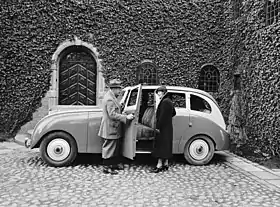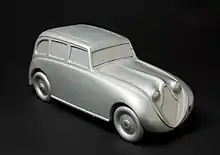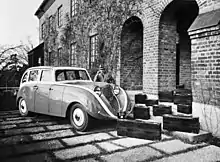Volvo Venus Bilo
The Volvo Venus Bilo was a concept car, which was revealed by Volvo Cars sometime in 1933. It was a streamlined design, with rear hinged doors and conventional doors in the side, to access the engine bay. It was designed to have one such great loading capacity.
| Volvo Venus Bilo | |
|---|---|
 | |
| Overview | |
| Manufacturer | Volvo Cars |
| Production | 1933 (Concept car) |
| Body and chassis | |
| Class | Luxury car |
| Body style | 4 door saloon |
| Layout | Front engine rear wheel drive |
| Related | Volvo PV 36 Carioca |


Nine specially designed suitcases could be fitted into spaces in the back, and any compartments in the right front fender (the left fender contained spare tyre and tools). A second spare tyre, in the rear, was used as the bumper. The design was done by Gustaf Ericsson, who was the son of Lars Magnus Ericsson.
It was based on the chassis of the Volvo PV655, and the coachwork was done by Gustaf Nordbergs Vagnfabrik AB, in 1932.[1] The name was a pun, referencing Venus de Milo, with bil meaning “automobile” in Swedish. The concept was a four door, four seater saloon, and it led to the Volvo PV 36 Carioca production car. The Carioca was also a four door saloon.
The fate of the car itself, is currently unknown. It was sold to a buyer in Denmark after World War II. In the middle of the 1950s, it was owned by the son of a scrapyard owner in Denmark, who rebuilt it into a pickup truck. It was used as late as 1956, after which there are no records of it.[2][3]
References
- "Streamlining as embodied in a foreign car". The New York Times. 18 February 1934.
- "Venus Bilo - Cars made in Sweden, info from Konditori 100 (ceased)". konditori100.se. 27 August 2010. Archived from the original on 27 August 2010. Retrieved 8 November 2020.
- "The search for Volvo Venus Bilo". volvovenusbilo.com. 8 November 2020. Retrieved 8 November 2020.
Nordberg, Nils (1969). Karossmakarens berättelser: glimtar från bilismens födelse och tillväxt i Sverige och om de stora bilälskarna (in Swedish). Stockholm: Rabén & Sjögren.